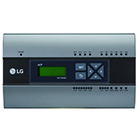LG offers more control with ACP 5 roll-out

The roll-out of LG Electronics’ (LG’s) newest central controller, the ACP 5, is kicking off in key markets throughout Europe including the UK. A fifth-generation control solution, the ACP 5 incorporates a number of upgrades that respond directly to users’ feedback. With LG’s innovative technologies onboard, the model boasts an exceptionally smart management system, expanded capabilities and features designed to increase operational efficiency.
A crucial component of the ACP 5 is its intuitive control setup. Rather than having to be on-site to operate the system, users can control it remotely from a PC, tablet or smartphone. Compatible with HTML5, the user interface (UI) is optimised for a range of devices.
The ACP 5’s integrated control allows for easier management of up to 256 indoor units and other equipment spread out over an extensive area. In addition to the integrated control of multiple units on an individual basis, it’s possible to control units as a group. Users can create multilevel grouping comprised of several zones, floors and buildings.
Users can monitor and control a variety of functions via the intuitive UI. At a glance, they can check operating status, energy usage trends and environmental conditions. With the ACP 5’s smart energy navigation function, users can adjust energy consumption to reduce costs.







